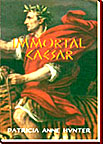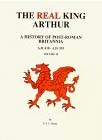By Fay Sampson
"The Roman army is invading Dumnon, Devon. In hill forts and sacred groves, druids and warriors quarrel over the fate of their tribe. Should they collaborate or resist? Impatient with their caution, the chief's son, Aidan the Red Fox, takes matters into his own hands. Cairenn is on the brink of marriage to Aidan. Her brother, Melwas, demands the weapons of a warrior, though he is still too young. What if the chief refuses to let him fight? As they bring the White Colt out for the sacrifice, Carienn is torn between fear for her lover, her brother and her people. As male and female druids compete for the soul of the tribe and the Roman legion marches relentlessly closer, brother and sister plunge into danger. "
Coming in August 2003
Subsection of Roman Times:
My personal book reviews and news about upcoming books and novels set in the ancient world.
Tuesday, July 29, 2003
Book Review: Immortal Caesar
 Patricia Hunter’s “Immortal Caesar” is well researched and provides a “human side” to one of the most famous figures in world history. Caesar is portrayed as an intellectually and physically mesmerizing man whose charisma attracted both men and women to his political causes and produced support for his personal ambitions. I also appreciated Hunter’s view of Caesar as an ardent lover but one who refrained from salubrious expressions of affection to the women in his life.
Patricia Hunter’s “Immortal Caesar” is well researched and provides a “human side” to one of the most famous figures in world history. Caesar is portrayed as an intellectually and physically mesmerizing man whose charisma attracted both men and women to his political causes and produced support for his personal ambitions. I also appreciated Hunter’s view of Caesar as an ardent lover but one who refrained from salubrious expressions of affection to the women in his life.
Of course I enjoyed Colleen McCullough’s latest novel about Caesar’s final years, “The October Horse”, but found her dialogue between Caesar and Cleopatra repeatedly sprinkled with “darling” somewhat a bit out of place in the mental image of an astute and articulate Caesar I had formed over the years reading her entire “Masters of Rome” series of novels as well as a number of the ancient sources.
My primary regret was that Hunter’s novel was short. I would have appreciated much more detail about Alesia and Caesar’s personal interaction with the Gauls (men and women – McCullough hinted at a relationship with a Gallic woman that resulted in a son), Caesar’s thoughts and actions during the battle of Miletus, his first major military engagement, and his personal interaction with Octavian.
McCullough portrayed the relationship between Caesar and Octavian so sympathetically that I actually developed a more positive viewpoint towards Caesar’s heir, at least until he allowed Lucius Caesar to be proscribed. So I would have been interested in another perspective.
Hunter also shares my speculation that Caesar’s seizures were caused by a head wound sustained at Munda rather than lifelong epilepsy, although McCullough’s suggestion of a condition resembling hypoglycemia was certainly plausible as well. The ancient sources do not mention this condition until later in his life.
I also liked Hunter’s casting of the relationship between Caesar and Calpurnia, much more so than the soap opera overtones of “I can’t live with you as husband and wife” that marked the end of the romance in the recent “Julius Caesar” miniseries on TNT Network. The affair with Cleopatra was just one of many over his lifetime and Calpurnia was well aware of Caesar’s notoriety with other women when she agreed to marry him. I think she would have accepted the situation as a matter of course, just as Hunter envisioned it.
“Immortal Caesar” is interesting, factual, and fast paced -- a good effort for a first novel.
Monday, July 21, 2003
Book Review: The Twelfth Vulture of Romulus by Boris Raymond
 Boris Raymond’s first novel, “The Twelfth Vulture of Romulus”, is a commendable effort. A former professor of history and sociology at Dalhousie University in Halifax, Nova Scotia, Canada, Raymond weaves his knowledge of the history and political processes of the late Roman Empire into a tale of intrigue and struggle for power between traditional Roman oligarchs and the increasing number of barbarian cultures who permeated Roman society both as slaves from the conquered lands and as members of Rome’s auxiliaries, legions, and officer corps.
Boris Raymond’s first novel, “The Twelfth Vulture of Romulus”, is a commendable effort. A former professor of history and sociology at Dalhousie University in Halifax, Nova Scotia, Canada, Raymond weaves his knowledge of the history and political processes of the late Roman Empire into a tale of intrigue and struggle for power between traditional Roman oligarchs and the increasing number of barbarian cultures who permeated Roman society both as slaves from the conquered lands and as members of Rome’s auxiliaries, legions, and officer corps.
The narrative swirls around the experiences of Orestes, a one-time secretary to Attila the Hun, who joins the ranks of the legions and, with his “qualifications of courage, industry, and experience, advanced with rapid steps in the military profession”1. In the process, he gains the notice of such prominent Roman aristocrats as Senator Aurelius Cassiodorus , chief of the Imperial Secret Service and ambassador to Attila during the reign of Emperor Valentinian III. His ultimate struggle for control of the Western Empire eventually pits Orestes against Odovacar, the son of Attila’s lieutenant, Edecon.
Raymond’s portrayal of the culture of the Huns and the personage of Attila recall the observations of the Greek writer Priscus.
“A luxurious meal, served on silver plate, had been made ready for us and the barbarian guests, but Attila ate nothing but meat on a wooden trencher. In everything else, too, he showed himself temperate; his cup was of wood, while to the guests were given goblets of gold and silver. His dress, too, was quite simple, affecting only to be clean. The sword he carried at his side, the latchets of his Scythian shoes, the bridle of his horse were not adorned, like those of the other Scythians, with gold or gems or anything costly.” – Priscus, fr. 8 in Fragmenta Historicorum Graecorum.
Raymond peoples his novel with many actual historical figures as well as fictional characters to shed insight into the politics and social life in the late Empire. I knew little about this period of Roman history before reading this book except the events portrayed in USA Network’s miniseries, “Attila”. So, I found the number of characters and their interconnections a bit overwhelming.
I think I would have excluded some of the plot entanglements to provide a more easily understood core message for less experienced readers. For example, the subplot of the events leading up to the settlement of the holy man, Severinus, in Noricum could probably have been better served in a novel of its own.
I also think Odovacar’s experiences should have paralleled Orestes’ throughout the novel to add more tension to the ultimate confrontation between the two men. Odovacar pretty much disappears about one-third of the way through the novel and does not resurface until the last few chapters. The reader is provided with a brief summary of his intervening experiences. But, since he will represent the fatal clash between the traditionalists and the Romanized barbarians that will inherit the Western Empire, I think his importance in the novel should have equaled that of Orestes to provide an antagonist of equal stature.
However, the work reveals much about a period of history seldom explored in detail and it has served to stimulate my interest in a number of the individuals who took the world stage in this tumultuous time. I hope Dr. Raymond will continue to share his understanding of past cultures with a public audience in this way. I have always felt that reading works that combine history and creative writing is the most memorable way to gain a knowledge and appreciation of other societies.
1 Gibbon, Edward. 1788. History Of The Decline And Fall Of The Roman Empire - Volume III
Friday, July 11, 2003
King of the Romans
 By John Gorman
By John Gorman
I just finished "King of the Romans" by John Gorman and thoroughly enjoyed it. The novel has elements of history, a touch of mythology, and wonderful characterizations of people from the period of the late Roman Empire. I particularly found it realistic in describing the decayed state of the Roman provinces when Rome could no longer protect them or maintain their roads, structures, etc. Gorman created an admirable Syagrius who embodied the ancient Roman values and struggled against the corruption of tribal war lords and unscrupulous members of the court of Constantinople.
"Gorman has put a human face on a period of history which is usually covered in a few short paragraphs. Syagrius (is) true to the values that built the Empire; he simply lives in a world that has discarded them." —Mike Huck reviewer for Inscriptions
The Real King Arthur: A History of Post-Roman Britannia A.D. 410-A.D. 593 (2 Vol.Set)
 By P.F.J. Turner
By P.F.J. Turner
A reviewer in Menlo Park writes: "This account, far beyond being simply "readable," is exciting and engrossing, progressing much as a mystery novel or detective story, where more and more clues are presented to the reader as the story progresses. And what's really astonishing is that, all the while, the book remains scholarly, very carefully citing its sources, discussing divergent theories, and providing evidence for its assertions, all of which allows the reader to participate in the action, rather than just sitting passively by. "
Subscribe to:
Posts (Atom)